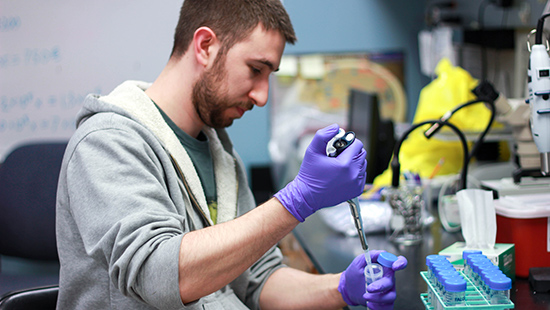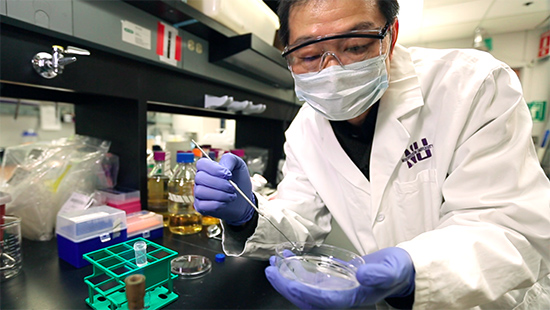Research
Watch VideoOur research program is ranked third nationally among all urology departments for National Institutes of Health Funding. Our multidimensional, highly transformative approach aims to translate scientific discoveries into impactful medical solutions for patients.
Areas of Research
Andrology
Conducting research to help advance men’s health in the fields of male reproductive medicine, sexual medicine and surgery.
Congenitalism
Analyzing the management and outcomes of patients born with congenital anomalies of the genitourinary system.
Endourology
Evaluating robotic surgery techniques to improve patient outcomes and developing interventions to reduce kidney stone formation and recurrence.
Population Health Research
Understanding population health research in prostate cancer aggressiveness and outcomes, and improving urologic healthcare.
Health Services and Outcomes Research
Studying care delivery and quality of care for urologic patients.
Infections, Inflammation and Pain
Developing new agents and interventions to improve outcomes and quality of life for patients with chronic pelvic pain and benign urologic conditions.
Nanotechnology
Creating the next generation of diagnostic and therapeutic nanoparticles.
Pediatrics
Performing basic science and clinical research to improve the treatment and outcomes for children with urologic conditions.
Prostate Cancer
Studying molecular, genetic and environmental contributors to prostate cancer to improve prostate cancer prevention, diagnosis and treatment.
Regenerative Medicine
Establishing new urologic tissue reconstruction models and developing treatment strategies for inflammation-based urologic conditions.
Reconstructive Urology
Developing novel surgical techniques for complex urologic reconstruction
Urologic Cancers
Researching mechanisms of bladder and kidney cancer initiation and progression to develop novel therapeutics and treatments for genitourinary malignancies.

Clinical Trials
Clinical trials test or study drugs, surgical procedures, medical devices or interventions with human subjects. Read more about our actively recruiting clinical trials.
Policies & Resources
Our department wants to support our investigators in their efforts by making sure they’re updated on all of our policies for conducting responsible research and the many resources available to them.

Resident Research
Our residents spend a year working with Northwestern faculty to design and implement a basic science or clinical research project of their choice. See our Residency Curriculum section for more information on the role of research in our residency program.

Nicole Handa
Dr. Handa is working with Dr. Ashley Ross and the PIQUE research group on a variety of clinical research projects aimed to reduce the morbidity of prostate cancer and its treatments. Much of her work will focus on genomic changes and using digital pathology augmented intelligence (AI) to try to identify predictive markers of progression of disease. Other projects will focus on how the prostate cancer microenvironment changes in response to different therapies and tools to risk stratify patients with favorable risk disease at time of diagnosis. She will also be collaborating with Northwestern Medicine Enterprise Data Warehouse team to harness machine-learning to try to predict which patients develop prostate cancer and which patients with prostate cancer experience rapid progression of disease.

Mitchell Huang
Dr. Huang is working with Dr. Hiten Patel and the PIQUE and KREW research teams on projects primarily focused on health services delivered to patients with elevated PSA and renal mass diagnoses. One of his primary projects involves analyzing the Veteran’s Health Administration (VHA) database for trends in health services administered to veterans with elevated PSA with a focus on identifying potential disparities in MRI utilization by race and geography. The eventual goal of this project is to create a validated risk-prediction tool to deploy in the VA system and to identify opportunities for quality improvement interventions. Similar work will be done looking at veterans diagnosed with renal mass in the VHA system.

Evan Panken
Dr. Panken is working with Dr. Joshua Halpern and Dr. Robert Brannigan on various projects aimed at advancing men’s health in the fields of sexual and reproductive medicine. His primary research focuses on the effects of environmental factors on semen parameters, including microplastics, air pollution, and water pollution. The goal is to better understand how these factors influence couples’ fertility. Investigating the impact of endocrine disrupting chemicals on our patients’ health can help inform individual patient decisions as well as public health policy and interventions. Additional projects include examining the role of serum testosterone in outcomes after urologic surgeries, assessing the impact of home semen testing for men in the early stages of family building, and evaluating the effects of fertility preservation mandates in expanding fertility preservation services.

Conor Driscoll
Dr. Driscoll is working with Dr. Shilajit Kundu on a variety of clinical research projects with one arm focused on the role of chronic inflammation in the development and progression of prostate cancer and the other arm focused on predictive studies on non-muscle invasive bladder cancer. Much of his chronic inflammation work will focus on TNF-alpha signaling and Decipher testing of prostate biopsies. For the bladder cancer work, he is using digital pathology augmented intelligence (AI) to try to identify predictive markers of BCG non-responders. Other projects will focus on racial disparities in return to continence post-prostatectomy and quality of life studies in men post-prostatectomy. He will also be collaborating with the Robert J. Havey MD Global Health Institute on research investing the urologic burden of disease in the Federated States of Micronesia as well as with the lab of Dr. Ziho Lee in projects on ureteral strictures and vesico-urethral anastomotic strictures.